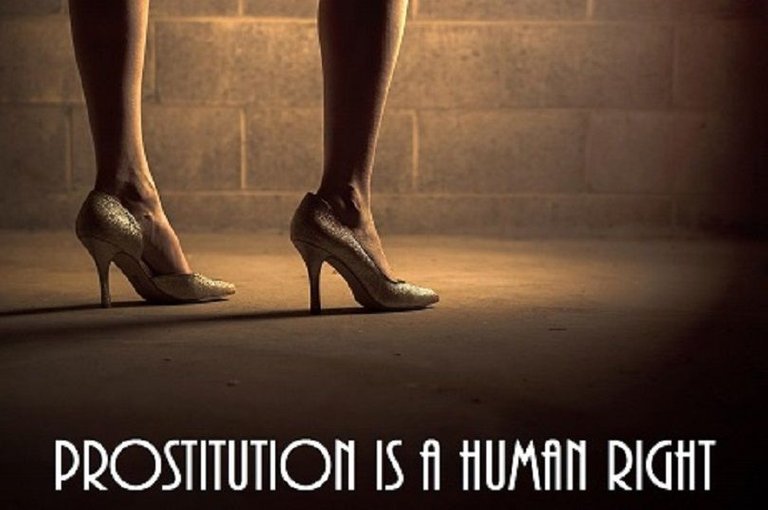
The libertarian view on this is simple. Prostitution in and of itself has no victim. What people want to do should not be hindered unless it causes harm to someone or steals something from them. When asking yourself what the libertarian stance on something is, that will always be the short answer. There are arguments from the left and the right as to why prostitution should remain illegal. It essentially boils down to morality vs. safety. If we’re honest with ourselves, regardless of the stated intent, we know what they want when laws are enacted; more control of our lives. Keeping it illegal only harms the people who are supposed be protected by laws. Obviously if you don’t want to do it, you shouldn’t. If you don’t want other people to do it...why is that your concern?
First and foremost, what I do with my body is absolutely no one’s business but my own. This is true for everyone and should not be up for debate. If we don’t have sovereignty over our own bodies, we have nothing. This applies to what I put in my body, what I take out of my body, what I think, what I say, and what my body is used for. All of these things should be my choice so long as no one else is harmed by what I am doing. That I am legally able to give sex away to anyone, or be paid to put the act on film, but not exchange money for a service provided is ludicrous.
Some people believe that no one legitimately wants to work in the sex industry. This is patently false. There are many people who would enjoy doing this sort of work if they were able to do it in a safe and legal way, and many who do it anyway. The reasons vary, but none should have to be justified to anyone else. This sometimes feels untrue because keeping prostitution illegal leads to sex trafficking, which leads to many doing it against their will.
Sex trafficking is a problem worldwide. It occurs because there’s a demand for it that no one can legally supply. When that happens, criminal enterprises take that business for themselves. This leads to all sorts of unsavory ideas about how to create the supply. This is true for any business. If it isn’t legal, it will still be available, it will just be significantly more dangerous for everyone involved. Some are arguing that forced trafficking is actually increased with legalization but the numbers don’t substantiate these claims. Statistics showing trafficking has increased take into account those who have willingly moved (legally or illegally) to a country that has legalized prostitution in order to work in the industry. Investigations into forced trafficking have turned up very little in these countries.

We cannot say that we care about the health and safety of sex workers if we continue to keep prostitution illegal. Because they aren’t following the law, they are subject to theft of earned wages by their employer, rape, assault, drug addiction, unwanted pregnancies, unwanted abortions, and other abuses that they’re either afraid to report, or that becomes the lowest priority of the police if it is reported. The latter will take more than legalization to fix, as the stigma won’t wear off just because no one is being arrested for it, but it’s a step in the right direction. They are subject to STDs at a much higher rate due to lack of testing and protection. Demands made to sex workers in unsafe, dangerous locations make it difficult to say no to unprotected sex, and condoms being used as evidence of prostitution greatly increases the chances of being arrested. Lack of testing due to money, embarrassment, attitude, or discouraging employers, leads to not only putting their lives at risk, but the lives of many customers and any family either might have.
Customer health and safety should not be ignored in this equation either. They often have to look to dangerous areas to find dangerous sex. There is no reason that wanting to pay for sex should automatically make them reviled, or deserving of illness and death. Conversely, a correlation has been shown with legal prostitution and the reduction of rape and STDs that would indicate that the health and safety of everyone would be improved by legalization.
Consider also, that the high arrest rate associated with prostitution amounts to more people in jail and with a criminal record for a victimless crime. We are already the world’s largest incarcerator, with 22% of the world’s prison population and 1 in 3 citizens having a criminal record. That might suggest that having a law doesn’t deter crime; particularly if that crime is a consensual act that harms no one. It only offers more opportunity for even more rights to be stripped from us.
Many worldwide organizations including Amnesty International, Human Rights Watch, The World Health Organization, and UNAIDS support decriminalization and legalization. Sex workers see legalization as the only way to maintain their rights and stay safe within their chosen profession. It’s even becoming a feminist cause within sex worker advocacy groups.
So what is the solution? Let the free market handle the business legally. Within the framework of a legal business, prostitutes can work in a safe environment. Someone who wants to make good money and stay in business will make sure that their employees are healthy and paid appropriately. Sex workers should enjoy all of the same benefits afforded to people in any occupation. Competition will ensure that the best companies get the most business in their target demographics and consumers can find what they want easily, affordably, and safely.
